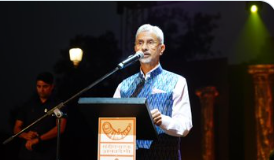
(Photo : x.com)
- India's EAM, S. Jaishankar, suggests the US is likely to become more isolationist, regardless of the election outcome.
- Jaishankar notes the US's reluctance to deploy troops and its withdrawal from Afghanistan under President Biden.
- He credits former President Trump with reviving the QUAD alliance, marking a significant development in Indo-Pacific cooperation.
- Jaishankar's observations necessitate a rethinking of international relations and collaborations, highlighting the need for a spirit of cooperation and mutual respect.
In a recent event in Canberra, India's External Affairs Minister (EAM) S. Jaishankar made a significant statement about the future of the United States' global role. He suggested that irrespective of the outcome of the US presidential election, the country is likely to become more isolationist. This observation reflects a long-term trend in US policy, which has been increasingly cautious about its global commitments since the Obama administration.
Jaishankar pointed out that the US has shown a reluctance to deploy troops and has withdrawn from Afghanistan under President Joe Biden. This trend, he suggested, is likely to continue regardless of who is in power. He also noted that President Trump was more expressive about this shift towards isolationism. However, he emphasized the importance of viewing the US more nationally than purely in terms of the ideology of the administration of the day.
Jaishankar's comments came during a panel discussion with the Foreign Ministers of Australia and New Zealand. All three ministers agreed on the need for their nations to step in to create the global environment they desired. They acknowledged the rise in protectionism, as noted by New Zealand's Winston Peters, and the changing world that they must adapt to.
US Isolationism and Global Politics
In a joint press conference with Australian Foreign Minister Penny Wong, Jaishankar also credited former US President Donald Trump with reviving the QUAD alliance in 2017, marking a significant development in Indo-Pacific cooperation. He expressed confidence that India-US ties would continue to grow, regardless of the election outcome.
This perspective on the US's future role in global politics is echoed in other news reports. For instance, one report highlighted Jaishankar's view that the US may adopt an increasingly isolationist stance, regardless of the election outcome. This shift, he suggested, is part of a long-term trend in US foreign policy, beginning as early as the Obama administration.
Another report quoted Jaishankar as saying, We all have an interest today in creating some kind of collaborative consensual arrangement. This reflects a recognition of the changing global dynamics and the need for nations to adapt and collaborate in response.
Historical Precedence and Future Implications
The shift towards isolationism in the US is not without historical precedent. In the early 20th century, following World War I, the US adopted a policy of isolationism, refraining from involvement in global conflicts and focusing on domestic issues. However, this policy changed with the onset of World War II. The current trend towards isolationism, as observed by Jaishankar, could be seen as a return to this earlier policy stance, albeit in a different global context.
* This is a contributed article and this content does not necessarily represent the views of btin.co.in









